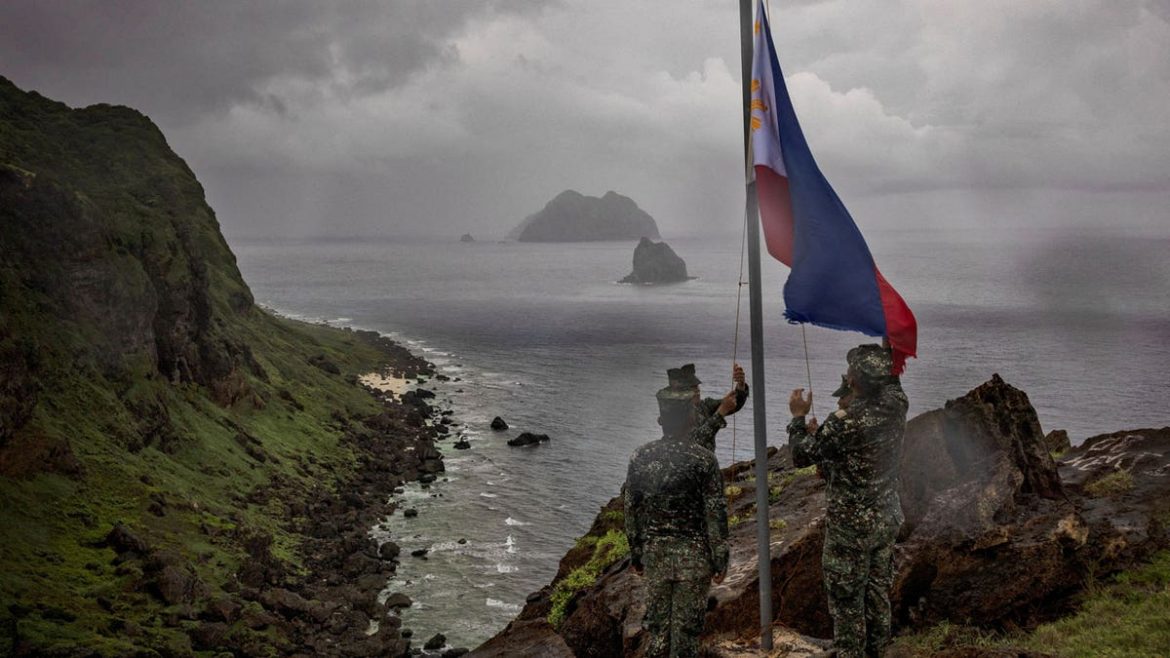Beijing warned that World War III could break out in the South China Sea as it increasingly shifts its attention to the Philippines, with territorial disputes driving tensions ever higher.
‘Although we have a mutual defense treaty with the Philippines, China is not respecting it,’ Gordon Chang, a China expert and fellow at the Gatestone Institute, told Fox News Digital.
‘It was twice last month, on the 5th and the 29th, that the State Department issued written warnings to China that we were prepared to use force to discharge our obligations pursuant to article four of the U.S. Philippines Mutual Defense Treaty,’ Chang explained. ‘That’s a warning that we are prepared to go to war.’
First reported by MEMRI’s China Media Studies Project, the state-owned and -operated news outlet China Daily earlier this week published an op-ed titled ‘Manila must be warned against horrors of war’ by Yang Xiao, deputy director of the Institute of Maritime Strategy Studies at the China Institutes of Contemporary International Relations.
Yang, a frequently featured expert in a range of China Daily articles, drew connections between the current tensions between China and the Philippines and tensions in Pre-World War I Europe.
The article notes at the bottom that ‘the views don’t necessarily reflect those of China Daily,’ but Yang engages in an inflammatory discussion of history and current tensions, referring to the ‘Sarajevo gunshot’ after warning against Philippine politicians’ ‘flirtation with the U.S. in the hope of gaining the upper hand in the maritime dispute with China.’
‘The lessons of World War I should be heeded, especially by small states, because triggering a conflict will serve no country’s interest,’ Yang wrote.
Later in the piece, Yang wrote that American ‘decision-makers’ should realize that ‘the U.S.’s military intervention on behalf of the Philippines would also be disastrous for neighboring countries. The South China Sea has been a sea of peace and cooperation.’
‘Only a handful of leaders in the Philippines, ignoring the increasing challenges, such as rising prices, at home, are stirring up the extreme sentiments of the people by feeding them anti-China rhetoric,’ Yang wrote. ‘What they don’t realize is that once the ‘Sarajevo gunshot’ is fired in Asia, the innocent people in East and Southeast Asian countries will become the biggest victims of war.’
China has most recently hassled the Philippines over disputed fishing shoals, with Chinese coast guards trying to chase Filipino fishermen away and leading to tense standoffs between the two.
Last year saw a series of near-clashes between the two coast guards near the Second Thomas Shoal. The Philippine authorities protested China’s use of a water cannon and military-grade lasers.
China established a claim to the Scarborough Shoal in 2012, after which the Philippines formally launched a protest that went before a United Nations-backed tribunal. A 2016 ruling went against China, rejecting Beijing’s claims on ‘historical grounds,’ but Beijing rejected the arbitration and its outcome.
The U.S., Japan, Australia and the Philippines on Apr. 7 will conduct the first full-scale joint naval exercise between the nations in the disputed territories to demonstrate fleet interoperability and provide a show of strength for China. The nations will then hold a summit in which they are expected to announce plans for joint patrols in the area later this year, according to Politico.
Chang argued that this kind of scattershot approach to stirring up tensions with neighboring countries is unsurprising as China ‘is probing its neighbors, especially Japan, Taiwan and the Philippines, and it shifts its attention, all the time.’
‘China ramped up pressure on the Philippines and then pressure … sort of died down in the last couple of days, and now they’re ramping up pressure on Taiwan,’ Chang said. ‘And while all of this is going on, we’ve now had more than 100 continuous days of Chinese vessels intruding into Japan’s waters in the East China Sea around the senkakus.’
‘So, really what they’re doing is they are pressuring, and then they’ll let up, and they’ll go someplace else and pressure at that place,’ he explained.
Chang stressed, though, that the Philippines remain ‘the weakest militarily’ of those three targets, despite the agreement of mutual defense with the United States.
‘Biden himself, on October 25th issued a warning from the steps of the White House when the Australian prime minister was visiting him that the United States was prepared to use force, so the Chinese just don’t believe Biden at all,’ Chang argued.
‘There are a lot of people out there who say we will be fighting China this year or next year,’ Chang added. ‘I’m not saying we will, but I’m saying if we will, it’s more likely that the fight starts over the Philippines than it starts over Taiwan or Japan.’
‘If you look at the situation involving the Philippines, it’s easier to construct an argument or a scenario that we’re going to go to war with [China] over the Philippines … because you got all the elements in place,’ he concluded. ‘You’ve got all the elements in place for a great power war that starts in the Philippines.’
